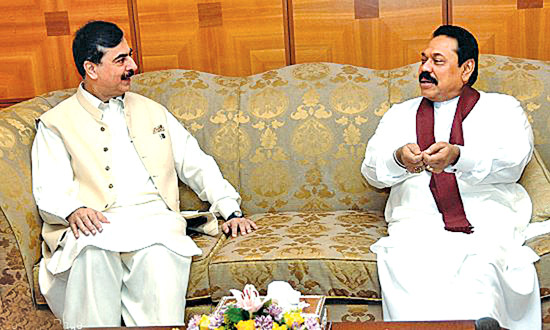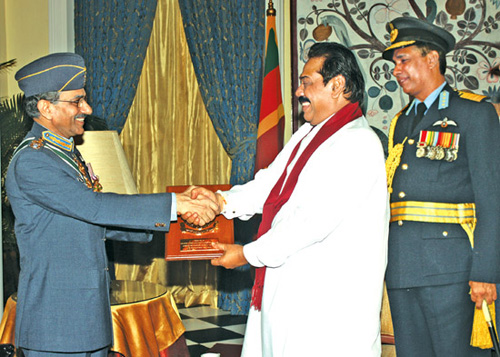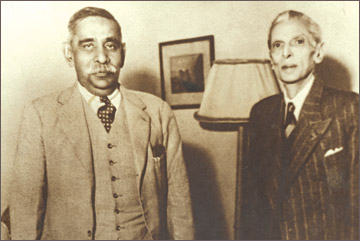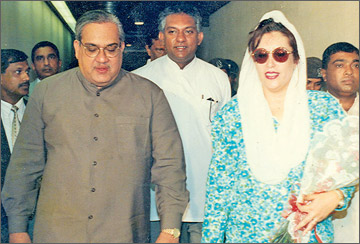|
Pakistan-Sri Lanka:
An overview of the all-weather friendship

Prime Minister of Pakistan Syed Yusuf Raza Gilani with President
of Sri Lanka Mahinda Rajapaksa |

Pakistan Air Force Commander Air Chief Marshal Rao Qamar Suleman
with Sri Lankan President Mahinda Rajapaksa |
The civilizational links between Pakistan and Sri Lanka date back to
the dawn of Buddhism. The archaeological sites in Taxila, adjacent to
Pakistan's capital city Islamabad, are a living testimony to this fact.
Ghandara trail was a part of the silk route and many Buddhist pilgrims
from different countries used to visit these sites on this historical
route.
Since the establishment of diplomatic relations between Pakistan and
Sri Lanka in 1948, the two countries have consistently maintained close,
cordial and mutually supportive relationship. Since inception Sri
Lanka`s foreign policy making has been influenced by not only the global
balance of power but also the regional balance of power that involves
India, Pakistan and China. Sri Lanka`s relationship with Pakistan,
established soon after Independence began on an open and friendly note.
Pakistan and Sri Lanka being located in the South Asian region and
being members of various regional and international bodies like UN,
commonwealth, NAM and SAARC are mutually important for each others. The
relationship between Pakistan and Srilanka is based on mutual trust and
commonality of interest in maintaining regional peace, security and
stability. Pakistan has always supported the unity, territorial
integrity and sovereignty of Sri Lanka. Both countries have shared
common perceptions on almost all regional and international issue and
are working together on all these forums for shared values and
interests.
The two countries, upholding their friendship and brotherhood, have
been helpful to each other during difficult times. During the India
Pakistan war in 1971, The Indian government disallowed Pakistan's
civilian air crafts' use of Indian air space. In that situation, Sri
Lanka defied India and allowed Pakistani civilian air crafts to fly via
Colombo to Dhaka and to use refilling facilities. Similarly, Pakistan's
timely and persistent assistance to Sri lanka during its 3 decade long
civil war proved significant.
The level of friendship between the two sides is also evident from
the number high level visits between the two sides. The formation of the
parliamentarians Friendship Associations in the national parliaments of
the two countries is another manifestation of cordiality at all levels
of governments. The Sri Lanka-Pakistan Parliamentarians Friendship
Association, a multiparty caucus of 30 members, was established in
Colombo in November 2007. The inaugural session of the Association was
held on November 21, 2007, in Colombo under the Chairmanship of the
Speaker of the Sri Lankan parliament. The Association is bi-partisan in
real sense and includes members from almost all political parties
represented in the Parliament. On similar lines, a Sri Lanka-Pakistan
Parliamentary Friendship Group has been established in the National
Assembly of Pakistan with speaker, Dr. Fehmida Mirza as its President.
Economic Cooperation/Pakistan - Sri Lanka Trade overview
Pakistan is the 2nd largest trading partner of Sri Lanka within the
South Asian region. The level of bilateral trade between Pakistan and
Sri Lanka increased as a result of the Free Trade Agreement (FTA). Trade
between the two countries increased from US$ 150 million to over US$ 300
million during the last three years, as it doubled within a short period
of time with the positive support gained from the FTA.

1948: D.S. Senanayake with Muhammad Ali Jinnah
in Karachi |

Shaheed Mohtarma Benazir Bhutto on a visit to Sri Lanka received
by Late Minister Anura Bandaranaike on arrival |
Bilateral trade between the two countries strengthened through an
increase in the number of products imported from and exported to Sri
Lanka such as fish, meat, vegetable, foliage, plant, sugar, biscuits,
pastry, cakes, mineral products, fiber boards, leather and leather-based
products, footwear, gems, jewellery, value-added copper products,
electrical items, bicycles, boats, and floating structures. There was a
great demand for Pakistani produces such as cotton yarn, fabrics,
potatoes, pharmaceutical products, knitted or crocheted fabrics,
articles of iron and steel, galvanized pipes, rice, fish, seafood,
textile articles, articles of apparel and clothing accessories, rods of
refined copper etc.
Sri Lanka was the first country to sign a Free Trade Agreement (FTA)
with Pakistan. FTA between Pakistan and Sri Lanka is operational from
June 12, 2005. Under FTA, Sri Lanka and Pakistan have agreed to offer
preferential market access to each others' exports by way of granting
tariff concessions. Sri Lanka enabled to enjoy duty free market access
on 206 products in the Pakistani market, while Pakistan, gained duty
free access on 102 products in the Sri Lankan market. The aim of a free
trade agreement is to reduce barriers, to facilitate exchange so that
trade can grow as a result of specialization, division of labor, and
most importantly via comparative advantage.
Items in the zero duty list of Pakistan include frozen fish,
vegetables, spices, fruits/juices, polymers of vinyl chloride in primary
forms, natural rubber, raw silk, tanned/crust skins, wool, some
varieties of paper and board, carpet and floor covering, non-alloy
aluminum, iron and steel products and toys/dolls.
Sri Lanka's zero duty items under the FTA include chickpeas, dates,
oranges, benzene, toluene, apparel and clothing accessories, ball
bearing, penicillin/ streptomycin/ tetracycline and their derivatives
and vacuum flasks.
Taking the concept forward, Pakistan Exhibition also known as the
'Little Pakistan' was organized in 2008 by the Pakistan High Commission
and the Trade Development Authority of Pakistan in Colombo showcasing
its quality products.
The aim of the exhibition was to promote Pakistan - Sri Lanka
economic relations by diversifying the existing trade patterns thus
introducing vide range of quality Pakistani products in the Sri Lankan
market for the first time with the prominent business and trade sectors
representing textiles, leather products, sports, surgical goods,
hospital and pharmaceutical equipment, cosmetics, furniture,
handicrafts, cutlery, gem and jewelry items and much more. More than 100
Pakistani trading and manufacturing companies participated in this
exhibition.
The two brotherly countries have also signed the Bilateral Investment
treaty in December 1997, which came into force in January 2000 after
ratification. In addition a memorandum of understanding between Board of
Investment Pakistan and Board of Investment Sri Lanka has also been
signed in February 2007 for strengthening of cooperation in all the
sectors of investment of both countries.
This MoU provides support to the enterprises on both sides and
encourages them to invest in both countries.
The two Boards of Investment also practice sharing of information on
investment polices and projects and encourage exchange of expertise.
Defense Cooperation
Since independence, Sri Lanka and Pakistan have consistently
maintained close, cordial and mutually supportive relations especially
in the field of defense. Both nations have assisted each other during
testing times in their history.
Pakistan and Sri Lanka have comprehensive and mutually beneficial
training collaboration for Army, Navy and Air Force. Over a period of
time, a strong bond of commitment and mutual understanding has been
reached between both the friendly armed forces.
In future too, both the brotherly countries are expected to work more
closely in the field of defence to boost peace efforts in the region.
Cultural Cooperation
A Cultural Agreement between Pakistan and Sri Lanka was signed in
December 1973 which provides the basis for meaningful cooperation in the
fields of folklore, music, dance, painting, exhibition, calligraphy etc.
The latest Cultural Exchange programme was signed between the government
of Pakistan and the Government of Sri Lanka in March 2006 during the
visit of President Rajapaksa to Pakistan covering the period from
2007-2011.
This programme provides for promotion of cultural, scientific, media
and educational relations between the two countries.
Besides other areas of cooperation, the Cultural Cooperation Exchange
programme provides for joint production of documentary films on topics
of national and historical interests, and organization of film
exhibitions.
Pakistan donated a number of relics of Lord Buddha discovered from
Buddhist establishments near Taxila. In 1959 the relic of heir of Lord
Buddha was also presented to the Government of Sri Lanka.
The iconic relic of 'Fasting Buddha' was exhibited in Sri Lanka in
2006, making it only the second country in the world (after Japan) to
receive the relic.
The two sides are also cognizant of the need for greater
collaboration in the tourism sector which would enhance greater
people-to-people contacts with particular emphasis on religious tourism.
Scholarships and funded Educational Programme
In order to assist Sri Lankan students to pursue quality education,
the Government of Pakistan extends 6 scholarships every year in the
fields of medicine, engineering, dentistry and pharmacy.
In addition, short-term courses in diplomacy, postal services,
railways, and banking are also being offered on annual basis.
Every year, Government of Pakistan extends 'Jinnah Scholarship' to
150-200 deserving Sri Lankan students to facilitate continuation of
their studies beyond O/Level and A/Level.
Disaster Relief Assistance
The recent floods in Pakistan affected over an estimated area of
150,000 Sq Km affecting over 2 million people in 72 districts. Sri Lanka
was amongst the first countries to respond and immediately dispatched a
C-130 Aircraft full of relief items. Sri Lanka also sent a 15-member
medical team along with medicines to assist in relief work. Other Relief
Goods worth millions of rupees were donated by the general public for
the assistance of the flood victims.
This was not the only instance in which support was extended to the
disaster affected population in the two countries. In recent years the
government and the people of Pakistan extended their support for the
tsunami affected population of Sri Lanka. Similarly, the Sri Lankan
government and public supported victims of the deadly earthquake of
October 2005 which claimed over 73,000 lives in northern Pakistan and
Azad Jammu & Kashmir. A donation of 500 metric tonnes of rice was made
for the benefit of those affected by October 2005 earthquake in
Pakistan.
Both sides have also discussed the establishment of early warning
system to avoid natural disasters in South Asia.
<<
BACK to main page |

